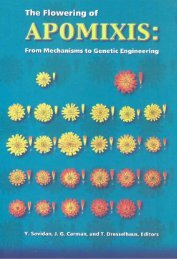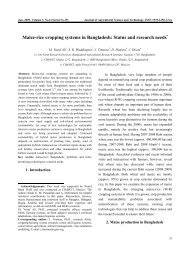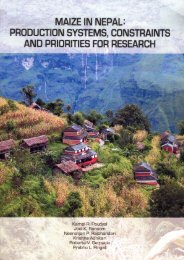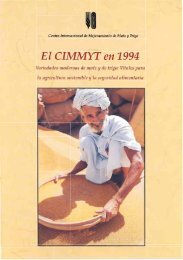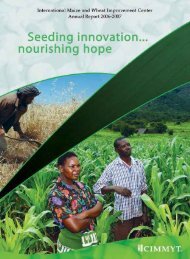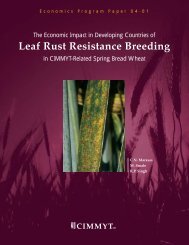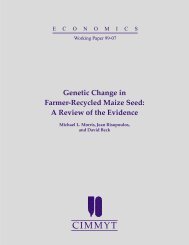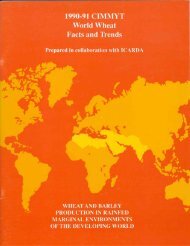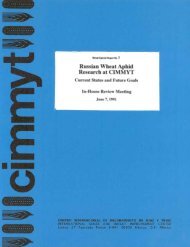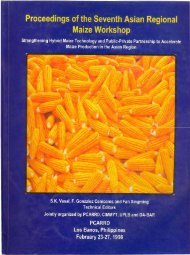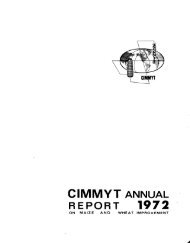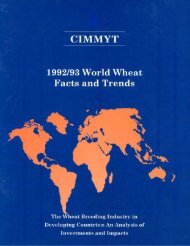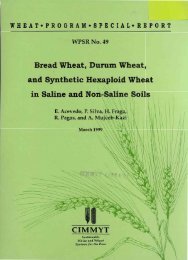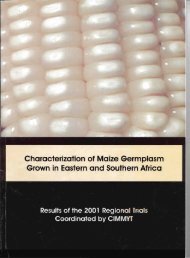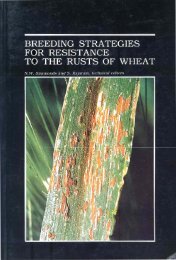REPORT - Search CIMMYT repository
REPORT - Search CIMMYT repository
REPORT - Search CIMMYT repository
You also want an ePaper? Increase the reach of your titles
YUMPU automatically turns print PDFs into web optimized ePapers that Google loves.
PROMOTION OF<br />
ACCELERATED MAIZE<br />
PRODUCTION PROGRAMS<br />
The UNDP and <strong>CIMMYT</strong> signed an agreement<br />
in March, 1970 to promote the joint<br />
development and use of high yielding, high<br />
lysine corn in Latin America. Subsistence<br />
farmers in Mexico, Central America, and the<br />
Andean Region of South America are the<br />
primary clientele.<br />
Experience gained in the Puebla Project<br />
should prove useful in this work. Since 1967,<br />
this project has field tested and refined a<br />
model to speed up the adoption of new corn<br />
varieties and production practices among<br />
small farmers. This model, which combines<br />
applied research, extension and coordination<br />
of infra-structural activities, offers a useful<br />
framework for programs now being organized<br />
in other countries.<br />
<strong>CIMMYT</strong>'s participation in these programs<br />
includes: assistance in the identification of a<br />
project area; selection and training of a team<br />
of (approx.) five agronomists; purchase of<br />
some vehicles for direct use in the project,<br />
and technical assistance to the project team<br />
during the initial stages of operation. Cooperating<br />
countries are expected to cover the<br />
operational costs of salaries, vehicle operation<br />
and repair, supplies and equipment.<br />
Cooperative maize production programs<br />
have entered initial stages in three cpuntries.<br />
A project area has been identified In Ecuador;<br />
and Colombia and Peru will select project<br />
sites during 1970. Colombia's team of agronomists<br />
was selected and sent to Mexico for<br />
training in JUly. A team from Peru is expected<br />
in Mexico for training by the end of 1970 and<br />
a team from Ecuador is due in 1971.<br />
In most cases, the training in Mexico will<br />
consist of a degree program at the Graduate<br />
College at Chapingo, plus direct participation<br />
in the field activities of the Puebla Project.<br />
This will generally require two years; hence<br />
it is expected that applied research activities<br />
in the cooperative program will be initiated in<br />
1971 through use of personnel and facilities<br />
of the country research institutes.<br />
Much of the world's food production is produced on small holdings by families who manage to provide<br />
enough for themselves and their farm animals, with little or no surplus to sell. The Puebla Project is<br />
aimed directly at bringing the benefits of modern production technology to these families, with an integrated<br />
program of improved practices, applied research and close work with agricultural agencies,<br />
political leaders, and agronomic input suppliers. A varietal demonstration is shown below, providing<br />
the farmers with first-hand knowledge of the new technology.



